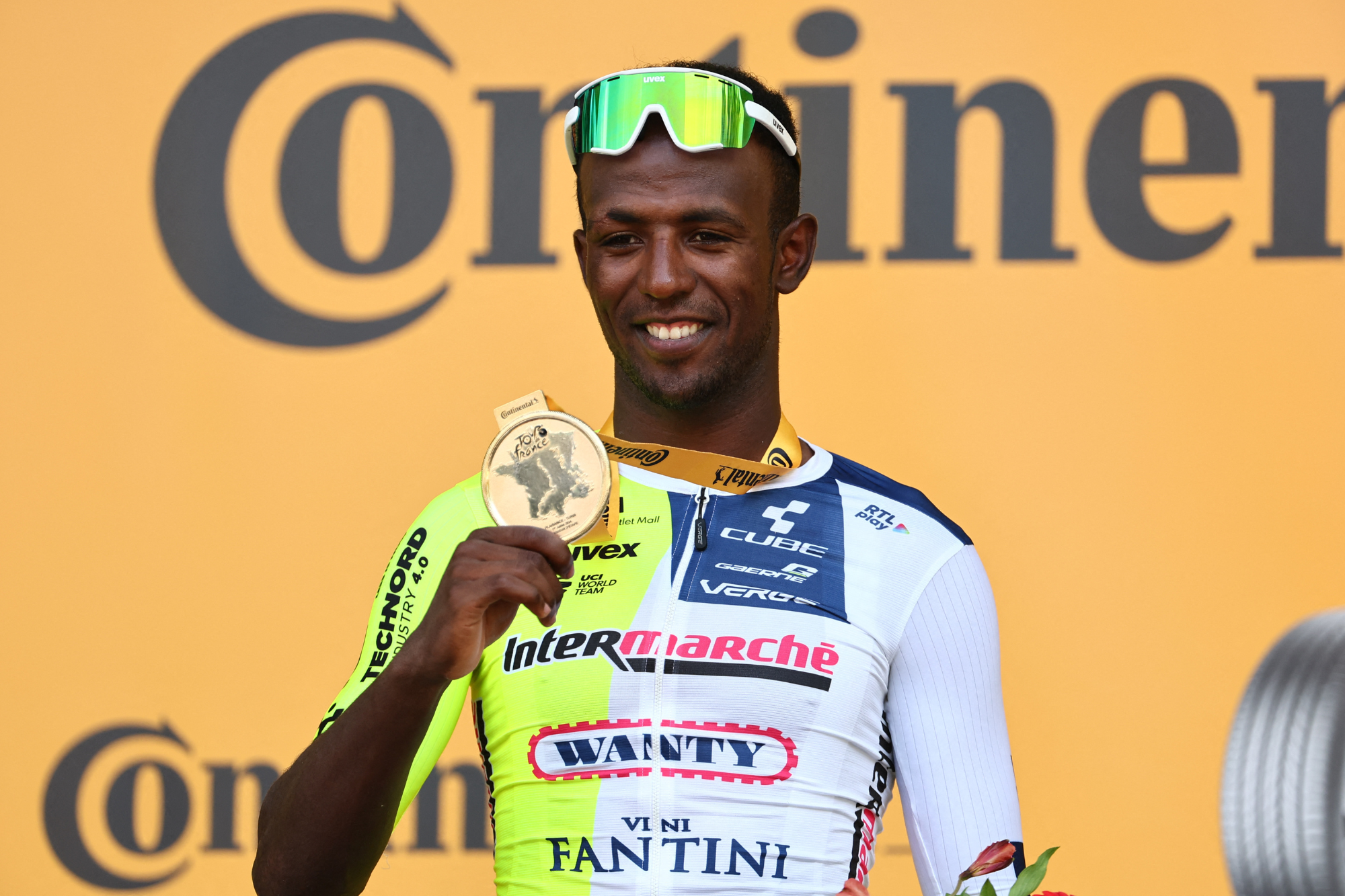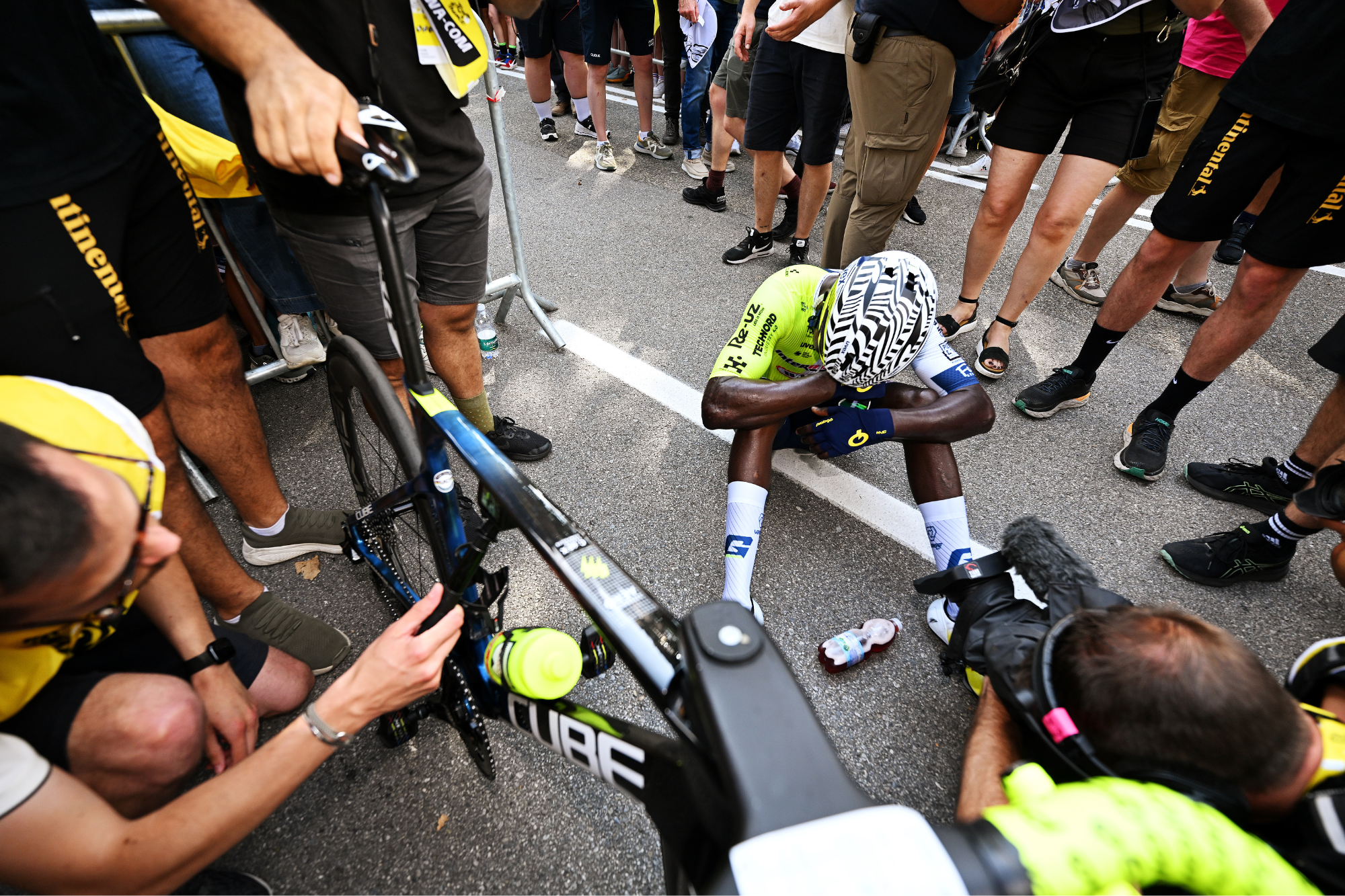
The Tour de France hoped – expected? – for history on stage three in Turin, but the occasion that ensued was different and much more significant than Mark Cavendish winning a 35th stage; Biniam Girmay triumphing ahead of the best sprinters in the world to become the first black African cyclist to win a stage in the race is a watershed moment for the sport, a ceiling, at long last, punched through.
While Cavendish, and almost every other bike rider in the professional peloton, had the opportunity as a child to watch the Tour de France on holiday, a young Girmay never had the chance to watch his heroes, which included Cavendish, in the flesh.
As a small and slight boy growing up in Eritrea's capital city of Asmara, some 5,000km from France, Girmay was introduced to cycling by his carpenter father at the age of 11. Every July, his dad would sit his family down after lunch and say "'come on, guys, turn on the TV – now it’s time to watch the Tour de France',” Girmay remembered. “He always showed us how the Tour de France is, how it works, how difficult it is, and that this is the number one sport in the world.”
Eritrea is cycling-mad, but it never had a cycling hero on the global stage until 2015, when Daniel Teklehaimanot wore the King of the Mountains jersey at the Tour for four stages. That was the moment when everything changed for a 15-year-old Girmay. “When Daniel won, I said, ‘Maybe this is possible, to be part of this [the Tour] one time," he said. "Daniel showed us everything is possible and that we [African cyclists] can win stages. My father said to keep believing."
Girmay progressed through the domestic ranks in Eritrea, but African bike racing is a world away compared to European cycling: pelotons are a fifth of the size, races are much shorter, and opportunities are few and far between. “There are a lot of obstacles, lots of ups and downs, and especially for African riders it’s not easy to be a professional,” Girmay explained. “We train and race in local races, but we don't have a lot of time to show our potential [on a wider scale].”
Unperturbed, Girmay was not to be defeated; he was obsessed with cycling. Living at 2,300m, he felt that he wasn’t born to go up mountains, but instead to push fast on the flat. “We don’t see a lot of black sprinters: everybody has slim bodies and less weight which means we are more used to the climbs, "he said. "But I grew up as a sprinter. [Peter] Sagan was my idol, also Cav.” He remembers going for rides where all he did was sprint intervals. “I always trained to improve my speed.”

At 18, Girmay was selected to train and live at the UCI’s World Cycling Centre in the Swiss Alps, but life was difficult: there was a language to learn, a new culture to adapt to, and friends to be made, all while being a long, expensive flight away from his family. “For one year I almost didn’t do anything because I needed to learn,” he recalled. “I knew nothing about Europe, it was totally different to Eritrea. I needed to learn English, to learn the cycling language, and that takes a while.” The racing education was the toughest, but bit by bit he adapted to bigger pelotons, faster racing and more difficult parcours.
He became a pro in 2020 with Nippo Delko One Provence, and progressed to the WorldTour in late 2021 with Intermarché-Wanty, first as a stagiaire. The following spring he won Gent-Wevelgem and then a stage of the Giro d’Italia. Limits were being reset, expectation was rising, and the question became ubiquitous, asked everywhere Girmay lined up: “Will you be the first black African to win a stage of the Tour de France?”
He shirked his response, finally settled into a rinse-and-repeat answer, but never felt truly appeared comfortable with the hope of an entire continent resting on his shoulders. But then, on July 1, 2024, the day when the cycling world was preparing itself for a different kind of history, a 24-year-old Girmay delivered the definitive answer to that question. He darting out of a perfect leadout, and won in Turin. For the first time in 121 years of Tour de France history, a black African is a stage winner.
“Today I think everybody will believe that African cyclists can do everything,” Girmay declared. “It means a lot personally for me, but especially for the continent. Eritrean cycling has a long history in cycling – we really have cycling inside our blood, we know so much about the Tour de France, and to win today is amazing. To see myself with the fastest in the world is unbelievable.”
The magnitude and significance of the victory was immediately present inside the Intermarché-Wanty camp. “My first words to the guys on the radio were, ‘We made history today,” smiled Aike Visbeek, the team’s lead sports director. “This is super important – there is a whole continent that has been waiting for this.”
Back in his home country, the scenes, Girmay predicted, would be pandemonium. “I think for sure a lot of things will be broken,” he laughed. “A lot of TVs I think. I remember two years ago when I won in the Giro d’Italia, I read that a lot of people said because of my victory they were in front of bars throwing bottles and tables because they were super happy. But today I think it will be…” he tailed off. “Crazy. I can’t imagine. It will be on fire.”







